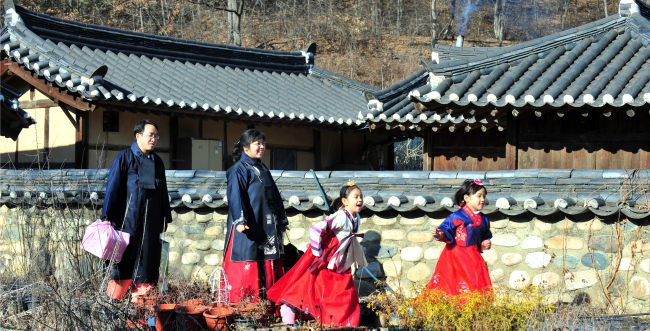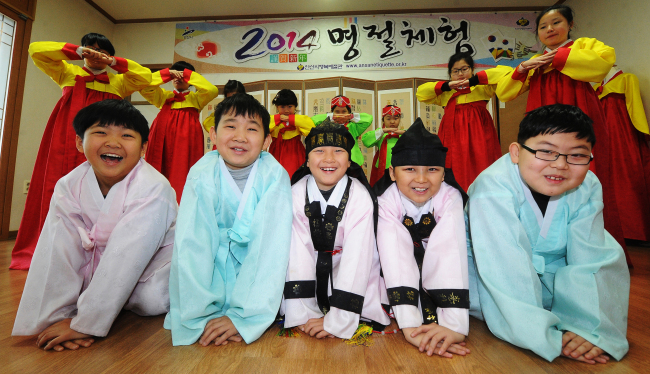[Weekender] Redefining meaning of Seollal
Confucian roots hold in Lunar New Year holidays, but change is in swing
By Korea HeraldPublished : Jan. 24, 2014 - 20:42

Tens of thousands of Koreans will hit the road Thursday, the official start of the Lunar New Year holidays, to head for their hometowns to spend time with parents and relatives.
Among them will be Lee Yeon-ju, a 42-year-old housewife living in Seoul. As always, her family will spend the first two days of the holidays with her husband’s parents in Gangneung, Gangwon Province. What is usually a three-hour drive could easily turn into a tedious five- to six-hour journey, but that is not what Lee dreads the most about the looming holiday.
“Seollal is not a holiday for me. It’s a work-till-you-drop day,” she said. This year, Seollal, or Lunar New Year, falls on Jan. 31.
If history is any guide, Lee will be flipping jeon, small-sized Korean pancakes, preparing all the food required for “charye,” an ancestral worship ritual that takes place on the morning of Seollal, and doing tons of dishes ― all under the supervision of an often-intolerable mother-in-law.
“My holiday starts from the minute I step out of the in-laws’ house,” she said.
Thirty-seven-year-old singleton Min Seong-hui has another reason to dislike Seollal. Instead of in-laws, she has plenty of uncles and aunts who seem to think that they have the right to be judgmental of the life of others.
“My marriage prospects suddenly become everyone’s interest,” a disgruntled Min said.
A few years ago, she got so irritated and told the relatives that she was trying but she wouldn’t hurry just because of her age.
“What I received was an onslaught of sermonizing over how my chances are dwindling year after year and that I will soon be over 40,” she said.
So, this coming Seollal, she plans to stay home in Anyang, Gyeonggi Province, together with her also miserably single 39-year-old brother. Her father, alone, will make visits to his living parent and relatives in Gwangyang, South Jeolla Province. Min also ditched the annual family reunion last Chuseok, and traveled to Japan with friends.

As children, both Lee and Min used to love every part of Seollal ― the new clothes, long trips to and from the grandparents’ and the overnight stay there with cousins, they recalled. But somewhere along the way, it stopped being fun.
That’s not a trend confined to the two.
Multiple surveys show traditional holidays are increasingly associated with negative images such as stress and divorce, and that people’s attitude toward them is changing.
In a poll conducted by Gallup Korea in the run up to Seollal last year, some 51 percent of the respondents said they looked forward to it, down from 65 percent the previous year. Thirty-seven percent said they felt unhappy about the coming holiday.
So why the change?
“As times have changed, so have families,” said Shin Kyung-ah, a sociology professor at Hallym University in Chuncheon, Gangwon Province.
Seollal traditions are held in such a way as to maintain the traditions of the country’s Confucian-based society ― most of which modern Koreans don’t adhere to.
“By performing charye and honoring ancestors, people got a sense of reassurance that their lineage was continuing well,” Shin said.
But in modern-day Korea, nuclear families are the norm and words like ancestors or a lineage don’t mean much, the professor said.
Kim Young-ran, a researcher at the Korean Women’s Development Institution, said that although the meaning of Seollal has weakened, the rituals and social obligations have persisted, putting pressure on many, particularly women.
“Seollal and Chuseok are probably two of the very few remaining areas where the legacy of Korea’s male-dominated, patriarchal past still holds sway,” she said.
Wives these days are asked to contribute to family income just like husbands. They believe in equal treatment, too.
“But when traditional holidays come, they suddenly have to play the role of a docile daughter-in-law devoted to looking after her parents-in-law and husband,” she said.
A study by her institution in 2012 offers a glimpse into how the traditional holidays are going to evolve in the future. Over 60 percent of the respondents projected less visits to paternal relatives, more contacts with maternal ones and a significant increase in the number of families abandoning charye.
In China, where the Lunar New Year is observed in similar ways, new trends are emerging, Kim noted. One of them is to spend the entire holiday with the husband’s family and then the next holiday with the wife’s family.
“Perhaps we may also see a trend like that emerge as Koreans reinvent their traditional holidays to meet the changing times,” Kim said.
By Lee Sun-young (milaya@heraldcorp.com)
-
Articles by Korea Herald








![[Kim Seong-kon] Democracy and the future of South Korea](http://res.heraldm.com/phpwas/restmb_idxmake.php?idx=644&simg=/content/image/2024/04/16/20240416050802_0.jpg&u=)








![[KH Explains] Hyundai's full hybrid edge to pay off amid slow transition to pure EVs](http://res.heraldm.com/phpwas/restmb_idxmake.php?idx=652&simg=/content/image/2024/04/18/20240418050645_0.jpg&u=20240418181020)

![[Today’s K-pop] Zico drops snippet of collaboration with Jennie](http://res.heraldm.com/phpwas/restmb_idxmake.php?idx=642&simg=/content/image/2024/04/18/20240418050702_0.jpg&u=)